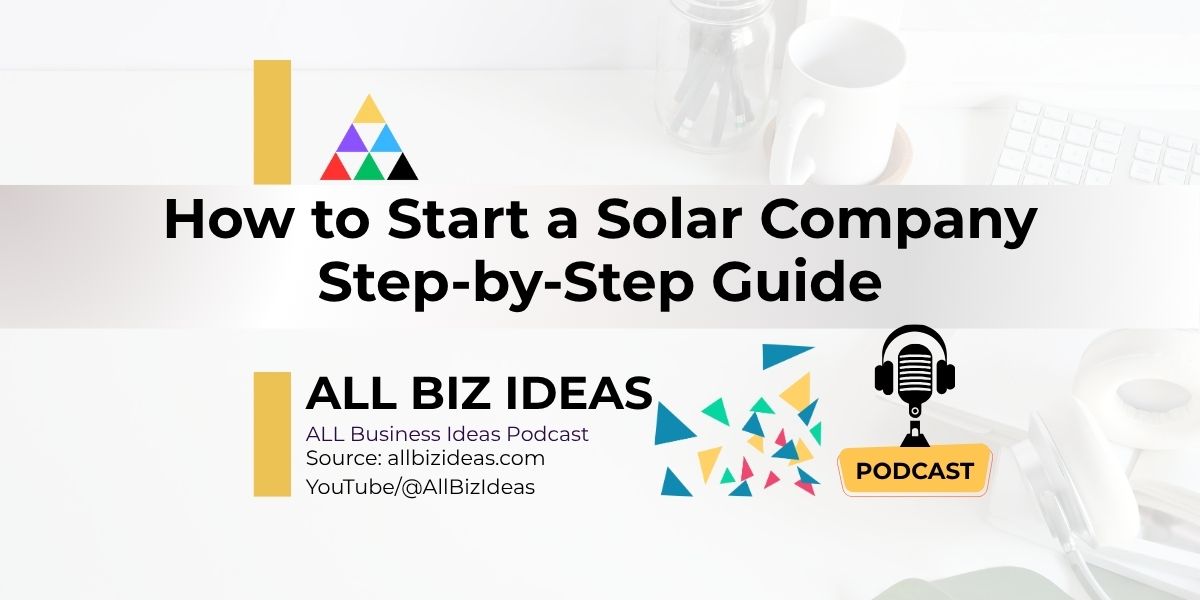How to Start a Solar Company? A Step-by-Step Guide | Download Free Solar Company Startup Checklist
Discover the step-by-step guide on how to start a solar company, and download the free solar company startup checklist. Review the beneficial facts for residential and commercial, and startup cost to start your solar business in a sustainable business niche. Explore the frequently asked questions below.
Step 1: Research the Solar Market and Regulations
What it is:
This step involves gathering comprehensive knowledge about the solar industry, your target customers, and the laws that govern solar energy in your region.
Why it’s important:
Without understanding the market and regulatory environment, you risk launching a business model that is either non-viable or non-compliant. Market research helps you identify demand, profitable niches, and potential barriers.
How to do it:
- Use industry reports (e.g., SEIA, IEA) to track trends and projections.
- Identify your local competitors and assess their offerings.
- Study customer behavior and energy needs in your region.
- Research state and federal programs like the Solar Investment Tax Credit (ITC), net metering, and Renewable Energy Credits (RECs).
- Contact local building departments to learn about zoning laws and permitting requirements for solar installations.
Step 2: Define Your Solar Business Model
What it is:
A business model outlines how your company will create, deliver, and capture value. It specifies what type of services you offer and to whom.
Why it’s important:
Choosing the right business model ensures your operations align with your skills, the market demand, and your startup budget. It also affects how you’ll market and scale your company.
How to do it:
- Choose a niche: residential, commercial, utility-scale, off-grid, or battery storage.
- Decide between service types:
- Installation Only: Partner with other companies or subcontractors.
- Full-Service EPC (Engineering, Procurement, Construction): High control, but requires more capital and staff.
- Solar Consultancy: Ideal if you’re more technically inclined and want low overhead.
- Sales/Lead Generation: Focus on acquiring customers for other solar providers.
Note: How to Start a Solar Company Business Model: Define your unique selling proposition (USP)—what makes your company different or better (e.g., faster installation, better financing, longer warranties).
Step 3: Develop a Solar Business Plan
What it is:
A formal document that outlines your business goals and the strategy to achieve them.
Why it’s important:
It helps you organize your ideas, identify challenges, attract investors, and stay focused. Many lenders and grant providers will require it.
How to do it:
Include the following sections:
- Executive Summary: High-level overview of your business.
- Market Analysis: Insights from Step 1.
- Services Offered: Details on your solar solutions.
- Marketing Plan: Your strategy for attracting and retaining customers.
- Operational Plan: How daily operations will run.
- Financial Projections: 3–5 years of revenue, costs, and profit forecasts.
- Funding Requirements: How much capital you need and how you’ll use it.
Note: How to Start a Solar Company Business Plan: Use tools and templates from the SBA website to structure your plan.
Step 4: Register Your Solar Business and Obtain Licenses
What it is:
This step covers the legal and compliance side of setting up a business.
Why it’s important:
It legitimizes your business and protects you from legal and financial risks.
How to do it:
- Choose a legal structure: LLCs are popular due to liability protection and tax benefits.
- Register your business name with your state or local government.
- Apply for an EIN (Employer Identification Number) from the IRS.
- Get a business license through your city or county.
- Obtain industry-specific licenses:
- NABCEP certification for solar installers (recommended).
- State contractor/electrical license (mandatory in many states).
- Insurance: Get liability insurance, workers’ comp, and potentially vehicle insurance if you have a crew.
Step 5: Secure Funding and Financial Resources
What it is:
Raising the capital you need to fund your startup and operations.
Why it’s important:
Solar startups are capital-intensive due to equipment, labor, vehicle fleets, and marketing costs. Without sufficient funding, you may not be able to complete projects or scale.
How to do it:
- Self-fund using savings or personal loans.
- Small Business Loans: Apply for SBA-backed loans or green business loans.
- Grants and incentives: Look into clean energy grants from government programs or environmental organizations.
- Investors: Approach angel investors or venture capitalists interested in green tech.
- Partner with financing companies: Offer customer financing through third-party lenders like Mosaic, GoodLeap, or Sunlight Financial.
Step 6: Build a Skilled Team
What it is:
Hiring the right people to carry out installations, sales, and support functions.
Why it’s important:
Solar projects require specialized skills. A professional, trained team ensures quality, safety, and customer satisfaction.
How to do it:
- Core roles to fill:
- NABCEP-certified installers or electricians
- Sales representatives with experience in solar or home improvement
- Project managers to coordinate logistics and permits
- Engineers/designers (optional, can be outsourced)
- Administrative staff
- Training programs: Use resources from NABCEP, SEIA, or local trade schools to train employees.
- Employee policies: Create safety guidelines, job descriptions, and performance metrics.
Step 7: Source Quality Solar Equipment and Suppliers
What it is:
Finding manufacturers and distributors who will supply your panels, inverters, batteries, and mounting systems.
Why it’s important:
The quality of your equipment directly impacts your reputation and warranty obligations.
How to do it:
- Research suppliers: Look for Tier 1 manufacturers like REC, QCells, or Enphase.
- Negotiate volume discounts or dealer partnerships.
- Evaluate product warranties, efficiency ratings, and compatibility.
- Inventory planning: Start with smaller inventory and scale up as you grow.
- Develop backup supplier relationships to avoid project delays.
Step 8: Create a Marketing and Sales Strategy
What it is:
A plan to attract leads, convert them into customers, and build your brand.
Why it’s important:
Even with the best service, you won’t grow without a steady stream of leads and conversions.
How to start a solar company marketing plan:
- Build a website optimized for local SEO.
- Use social media marketing to share customer testimonials and educational content.
- Run paid ads (Google Ads, Facebook) targeting solar-related search terms.
- Offer referral programs to incentivize word-of-mouth.
- Attend trade shows and partner with realtors/home builders.
- Provide financing options to reduce price objections.
Step 9: Install and Monitor Your First Solar Projects
What it is:
Executing your first installations and gathering data on their performance.
Why it’s important:
These initial projects set the tone for your brand reputation and future growth.
How to do it:
- Start small: Focus on local residential projects to build your portfolio.
- Document each project: Take before/after photos, get testimonials, and publish case studies.
- Ensure compliance: Follow NEC codes, local laws, and inspection requirements.
- Offer warranties and maintenance plans.
- Use monitoring platforms (like Enphase Enlighten or SolarEdge) to track energy production and identify issues.
Step 10: Focus on Growth and Sustainability
What it is:
How to start a solar company by optimizing and scaling your business while staying environmentally and financially sustainable.
Why it’s important:
Once your solar company is established, growth and innovation keep you competitive and profitable.
How to start a solar company for scaling and growth:
- Expand your services: Offer EV charging, battery storage, or energy audits.
- Improve your tech stack: Invest in advanced CRM, automated design tools, and analytics dashboards.
- Pursue certifications: LEED, B Corp, or ISO environmental standards.
- Explore new markets: Move into commercial or municipal contracts.
- Track KPIs: Monitor metrics like customer acquisition cost (CAC), installation time, system uptime, and ROI.
Frequently Asked Questions
1. What are the fundamental steps involved in starting a solar company?
Starting a solar company involves a comprehensive, multi-stage process. It begins with thorough market research to understand the industry, target customers, and regulatory landscape, including local zoning laws and federal incentives like the Solar Investment Tax Credit (ITC).
Following this, you must define your business model, choosing a niche (e.g., residential, commercial, utility-scale) and service type (e.g., installation only, full-service EPC, consultancy).
The next crucial step is developing a detailed solar business plan outlining your goals, strategies, and financial projections, which is essential for attracting funding. This leads to registering your business legally and obtaining necessary licenses, such as NABCEP certification and state contractor licenses, along with securing appropriate insurance.
Subsequently, you need to secure funding as solar startups are capital-intensive. Building a skilled team of certified installers, sales reps, and project managers is vital. Simultaneously, sourcing quality solar equipment from reputable suppliers is crucial for reputation and warranty. Finally, developing a robust marketing and sales strategy to attract customers and successfully installing and monitoring initial projects lays the groundwork for sustained growth and sustainability in the booming clean energy sector.
2. Why is market research and business model definition so critical before launching a solar company?
Market research and defining your business model are critical because they form the strategic foundation for your solar company’s viability and success. Market research helps you understand demand, identify profitable niches, analyze competitors, and navigate the complex regulatory environment (e.g., net metering, RECs, permitting). Without this understanding, you risk creating a non-viable or non-compliant business. It informs your unique selling proposition (USP) – what makes your company different or better.
Defining your business model then outlines how your company will create, deliver, and capture value. It ensures your operations align with your skills, market demand, and startup budget, directly impacting how you market and scale. Choosing the right niche (residential, commercial, utility-scale) and service type (e.g., installation, EPC, consultancy) allows for focused resource allocation and targeted customer acquisition.
3. What are the typical startup costs for a small to medium-sized solar installation company?
The estimated startup costs for a small to medium-sized solar installation company in the U.S. range from $55,000 to $165,000. These costs are distributed across several categories:
- Business Registration & Legal: $1,000 – $3,000 (LLC setup, EIN, licenses, consultations).
- Insurance & Bonding: $2,000 – $5,000/year (general liability, worker’s comp, equipment insurance).
- Certifications & Training: $2,500 – $6,000 (NABCEP, OSHA for team members).
- Tools & Equipment: $5,000 – $15,000 (ladders, drills, inverters, safety gear, racking tools).
- Vehicle Purchase or Lease: $15,000 – $40,000 (for transporting panels and crew).
- Office or Warehouse Space: $1,000 – $3,000/month (optional for startups, home office possible).
- Software Licenses: $1,000 – $5,000/year (CRM, design tools like Aurora Solar, accounting software).
- Marketing & Branding: $3,000 – $10,000 (website, SEO, advertising, materials).
- Initial Inventory or Supplier Credit: $10,000 – $30,000 (depending on upfront panel purchases or supplier credit).
- Labor (First 3 Months): $15,000 – $50,000+ (wages for installers, sales, admin). These costs can be reduced by starting with subcontractors, leasing tools, or focusing initially on sales/design and partnering with installers.
4. What are the primary benefits of solar adoption for residential customers?
Solar adoption offers several significant benefits for residential customers:
- Energy Cost Savings: Homeowners can reduce their electricity bills by 50–100%, with a typical 6kW residential system saving $1,500–$2,000 per year. The average U.S. household consumes approximately 10,500 kWh/year, making these savings substantial.
- Increased Property Value: Studies indicate that homes with solar installations sell for an average of 1% more, viewing solar as a valuable upgrade similar to a kitchen renovation.
- Incentives and Tax Credits: Homeowners can leverage the U.S. federal 30% Investment Tax Credit (ITC) available through at least 2032, along with potential state-specific rebates, performance-based incentives (PBIs), and property tax exemptions.
- Energy Independence & Reliability: When paired with battery storage, solar provides a reliable backup power source during grid outages, offering peace of mind and resilience, especially in areas prone to extreme weather or high electricity rates.
5. How does solar energy benefit commercial businesses?
Solar energy provides substantial benefits for commercial businesses:
- Operational Cost Reduction: Commercial buildings can significantly reduce peak demand charges, which can account for up to 50% of their electricity bill. Solar systems typically have a payback period of 4–7 years for businesses, with a panel lifespan of 25+ years.
- Depreciation Incentives (MACRS): Businesses can depreciate their solar investment under the Modified Accelerated Cost Recovery System (MACRS), leading to significant tax savings in the first year.
- Sustainability & Corporate Social Responsibility (CSR): Adopting solar helps businesses meet environmental, social, and governance (ESG) goals, enhancing their brand perception and attracting eco-conscious consumers. This can provide a competitive edge.
- Net Metering & Demand Control: Many utilities allow commercial solar customers to sell excess power back to the grid, and large-scale systems help reduce the overall load on utility infrastructure, contributing to grid stability.
6. What roles are essential for building a skilled team in a solar company?
Building a skilled team is paramount for a solar company’s success, as specialized skills are required for quality, safety, and customer satisfaction. Essential core roles include:
- NABCEP-certified Installers or Electricians: These professionals are crucial for the technical installation and safe operation of solar systems.
- Sales Representatives: Individuals with experience in solar or home improvement sales are needed to acquire and onboard customers.
- Project Managers: These roles coordinate logistics, manage permits, and ensure projects stay on schedule and budget.
- Engineers/Designers: While optional for smaller startups (can be outsourced), these roles are vital for system design and optimization.
- Administrative Staff: Support staff are necessary for day-to-day operations, customer service, and record-keeping. Ongoing training programs through organizations like NABCEP and SEIA are recommended to maintain a highly competent workforce.
7. What is the significance of the Investment Tax Credit (ITC) for solar companies and their customers?
The Investment Tax Credit (ITC) is a significant federal incentive that plays a crucial role in promoting solar adoption for both residential and commercial sectors. For customers, it offers a 30% tax credit on the cost of installing solar energy systems, available through at least 2032. This substantial reduction in upfront costs makes solar installations more affordable and accelerates the return on investment. For solar companies, the ITC directly increases the affordability and attractiveness of solar energy, thereby driving demand and facilitating sales. It helps customers overcome initial financial barriers, making solar a more compelling and accessible option, which is essential for the growth and profitability of solar businesses.
8. Why is focusing on growth and sustainability important for an established solar company?
Once a solar company is established, focusing on growth and sustainability is vital to remain competitive and profitable in the long term. This involves:
- Expanding Services: Offering additional solutions like EV charging stations, battery storage, or energy audits diversifies revenue streams and meets evolving customer needs.
- Improving Technology Stack: Investing in advanced CRM systems, automated design tools, and analytics dashboards enhances operational efficiency, project management, and customer experience.
- Pursuing Certifications: Achieving certifications like LEED, B Corp, or ISO environmental standards demonstrates a commitment to quality and sustainability, boosting brand reputation.
- Exploring New Markets: Venturing into commercial or municipal contracts can open up larger project opportunities and diversify the client base.
- Tracking Key Performance Indicators (KPIs): Monitoring metrics such as customer acquisition cost (CAC), installation time, system uptime, and ROI provides critical insights for continuous optimization and strategic decision-making, ensuring financial health and long-term viability.
Why a Solar Company Benefits Residential and Commercial Sectors
How to start a solar company by focusing on the residential sector:
Residential Sector Benefits
- Energy Cost Savings
- According to the U.S. Energy Information Administration (EIA), the average U.S. household consumes ~10,500 kWh/year.
- With solar, homeowners can reduce electricity bills by 50–100%, depending on system size and location.
- A typical 6kW residential solar system can save $1,500–$2,000 per year in electricity costs.
- Increased Property Value
- Studies by Zillow show homes with solar sell for 1% more on average.
- Homeowners view solar as an upgrade, similar to a renovated kitchen.
- Incentives and Tax Credits
- The U.S. federal government offers a 30% Investment Tax Credit (ITC) through at least 2032.
- Many states offer additional rebates, performance-based incentives (PBIs), and property tax exemptions.
- Energy Independence & Reliability
- Paired with battery storage, solar provides backup during grid outages.
- Growing demand in areas affected by extreme weather or high electricity rates (e.g., California, Texas, Florida).
How to start a solar company by focusing on the commercial sector:
Commercial Sector Benefits
- Operational Cost Reduction
- Commercial buildings can reduce peak demand charges, which account for up to 50% of their electric bill.
- Solar payback periods for businesses range from 4–7 years, with 25+ years of panel lifespan.
- Depreciation Incentives (MACRS)
- Businesses can depreciate the solar investment under the Modified Accelerated Cost Recovery System, saving thousands in taxes in the first year.
- Sustainability & CSR
- Businesses gain a competitive edge by meeting environmental, social, and governance (ESG) goals.
- Solar adoption improves brand perception and can influence eco-conscious consumers.
- Net Metering & Demand Control
- Many utilities allow commercial solar customers to sell excess power back to the grid.
- Large-scale systems help reduce overall load on utility infrastructure.
Startup Costs to Launch a Solar Company
Startup costs vary depending on scale, location, and service model. Below is an estimated breakdown for a small to medium-sized solar installation company in the U.S.
Expense Category | Estimated Cost (USD) | Notes |
Business Registration & Legal | $1,000 – $3,000 | Includes LLC setup, EIN, licenses, legal consultations |
Insurance & Bonding | $2,000 – $5,000/year | General liability, worker’s comp, equipment insurance |
Certifications & Training | $2,500 – $6,000 | NABCEP, OSHA training for team members |
Tools & Equipment | $5,000 – $15,000 | Ladders, drills, inverters, safety gear, racking tools |
Vehicle Purchase or Lease | $15,000 – $40,000 | For transporting solar panels and crew |
Office or Warehouse Space | $1,000 – $3,000/month | Optional for startups; can begin with a home office |
Software Licenses | $1,000 – $5,000/year | CRM, design tools (e.g., Aurora Solar, SolarEdge), accounting software |
Marketing & Branding | $3,000 – $10,000 | Website, SEO, advertising, printed materials |
Initial Inventory or Supplier Credit | $10,000 – $30,000 | Depending on whether you buy panels upfront or use credit from suppliers |
Labor (First 3 Months) | $15,000 – $50,000+ | Wages for installers, sales, admin |
Total Estimated Startup Costs: $55,000 – $165,000
Note: How to start a solar company by leveraging with other players in the niche: You can significantly reduce costs by starting with subcontractors, leasing tools, or focusing on sales/design only and partnering with installers.
Summary of Business Case
Sector | Primary Benefit | ROI Period | Incentives Available |
Residential | Lower utility bills, increased home value | 6–10 years | 30% ITC, state/local rebates |
Commercial | Reduced operational costs, tax savings | 4–7 years | ITC, MACRS depreciation, net metering |
Conclusion on How to Start a Solar Company
Launching your own solar company is both impactful and potentially lucrative. By understanding how to start a solar company through thorough planning, smart resource allocation, and a strong commitment to service, you position yourself to thrive in the booming clean energy sector.
Understanding how to start a solar company includes not just the technical and operational steps, but also a deep appreciation of the market need. Both residential and commercial sectors are actively seeking energy-efficient, cost-saving solutions. With substantial government support, growing environmental awareness, and rising utility costs, solar companies are poised to meet a massive and growing demand. Solar energy is booming in the United States. The booming green and sustainable businesses are well worth considering.



